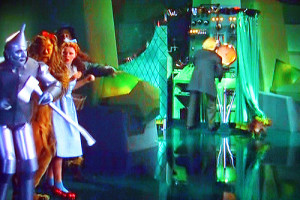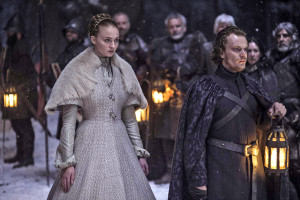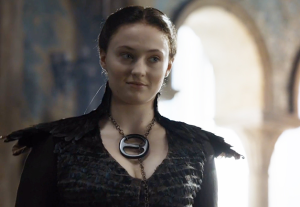 Great writers wield literary devices like a needle, with an insertion point so tiny that the audience won’t even notice the method until all of the threads of story pull taut and knot together. Others get their plot from point A-to-B with bludgeoning tools like “audience surrogates” or deus ex machina. It’s not always artful, but as Annie Wilkes (Stephen King’s obsessed fan from 1987’s Misery) once said, it is fair. Because, while heavy handed technique may flash a glimpse of the wizard behind the curtain, other elements like consistent character arcs can still keep the viewer or reader grounded, if only up to their toes, in the story. What Game of Thrones did in their season five episode, “Unbowed, Unbent, Unbroken,” was definitely not fair.
Great writers wield literary devices like a needle, with an insertion point so tiny that the audience won’t even notice the method until all of the threads of story pull taut and knot together. Others get their plot from point A-to-B with bludgeoning tools like “audience surrogates” or deus ex machina. It’s not always artful, but as Annie Wilkes (Stephen King’s obsessed fan from 1987’s Misery) once said, it is fair. Because, while heavy handed technique may flash a glimpse of the wizard behind the curtain, other elements like consistent character arcs can still keep the viewer or reader grounded, if only up to their toes, in the story. What Game of Thrones did in their season five episode, “Unbowed, Unbent, Unbroken,” was definitely not fair.
In the season’s sixth episode, we continue to follow Sansa Stark, who has been smuggled from captivity at King’s Landing, to a hiding spot in the Eyrie, to supposed safety at her ancestral home of Winterfell, which is now controlled by her father’s former bannerman and her brother’s killer, Roose Bolton. There has been clear deviations from her character’s story in George R. R. Martin’s book series, and we’ll talk about those decisions in a bit. Sansa, over the last season, has been through the grinder and clearly come out on the other side stronger, darker, and with a understanding of her own power that can only develop from an experienced survivalist. She’s badass is what we’re saying.
Her story arc in the show is actually that of another character in the books, Jeyne, a young northern girl and friend of Sansa who is sent to the Boltons to marry the sadistic monster, Ramsay. Jeyne is passed off as Arya Stark and is the key to maintaining Roose and Ramsay’s tenuous hold on the North. It wasn’t a bad deviation and made sense for a show that has to build multimillion dollar sets and pay actors to consolidate a few story lines. So, according to the most recent timeline of the show, Sansa Stark is betrothed to Ramsay Bolton on the advice of Petyr Baelish, who promises her that well…no marriage need last forever. Did he know Ramsay’s true nature? It’s not possible to tell.
We did though, the audience. We watched him hunt woman for sport and knew that he spent a season violently torturing and eventually castrating Theon Greyjoy, Sansa’s foster brother. But still, we weren’t worried, because while Jeyne Poole was a girl without a position, family, or identity, Sansa was a high born noble and was promised support of all her people. She had power and position over Ramsay. What narrative sense did it make then, for the episode to end with Sansa succumbing to the same fate as that of a completely different character?
None, because we already knew Ramsay was a bastard, so to speak. We knew he was a monster before he viciously raped Sansa Stark, so it can’t be argued that a judgement call was made to sacrifice her character development for his. It’s been said the writer’s wanted to up the stakes for fans. I agree, that was the motivation behind the disjointed decision making. They used a similar trick with Joffrey Baratheon, which is to say in the show, he was made more despicable and hateful so that fans would anticipate and tune in just to see him get his just deserts.
but Joffrey in the books is still a 13-year-old kid. And there’s kind of a moment there where he knows that he’s dying and he can’t get a breath and he’s kind of looking at Tyrion and at his mother and at the other people in the hall with just terror and appeal in his eyes—you know, “Help me mommy, I’m dying.” And in that moment, I think even Tyrion sees a 13-year-old boy dying before him. So I didn’t want it to be entirely, “Hey-ho, the witch is dead.” I wanted the impact of the death to still strike home on to perhaps more complex feelings on the part of the audience, not necessarily just cheering.
– GRRM in an interview discussing what he intended with Joffrey’s character
These decisions are not tactics to enrich or develop characters, they’re devices to manipulate an audience and are where the puppet strings in the writing are easiest to see. It’s never a good direction when writers are making decisions based on meta participation in fandom which is a community around the show. Game of Thrones is behaving so backwards. The Ramsay/Sansa union has already been referred to as the white wedding, like the purple and red before it, so fans can and will argue about the disturbing turn of events with a new hashtag that is practically written for us. So yes, eventually Sansa will have her revenge and kill Ramsay, and if tradition serves it will mostly likely occur in the penultimate episode of the season, but it will be several episodes too late for the story to be served.

What do you think about last Sunday’s episode
**Update, after the loving Stannis grew as a parent all season, he torches his daughter Shireen in episode 9. If this show is an emotional rollercoaster, it’s one that would crash and kill a whole lot of people in Roller Coaster Tycoon.
Kaitlyn D
Senior Staff Writer
@deadrabbit92















